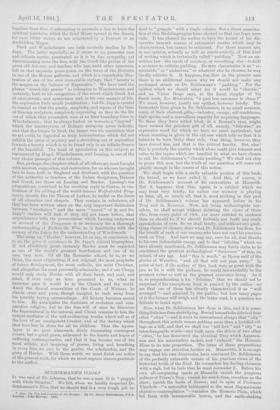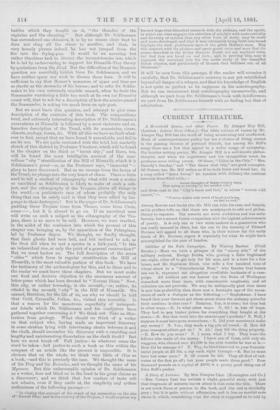SCLHIEMANN'S ILIOS.* IT was said of Dr. Johnson, that he
was a man fit to "grapple with whole libraries." We felt, when we hastily inspected Dr. Schliemann's Mos, that we should find it a very tough job in-
• Moe: the Clip and Conn frp of the 2'rgiane. By Dr. Henry Sohltemann, F.S.A. London John Murray. 1880.
deed to " grapple " with a single volume. But a 'closer examina- tion of this 13robdingnagian tome showed us that our fears were vain. It has pleased the author to bury the kernel of his dis- coveries beneath masses of extraneous matter which may be characterised, but cannot be criticised. For these masses are, in our opinion, actually as well as constructively, of that kind of writing which is technically called " padding." Now an un- written law--the result of courtesy, or something else—forbids a reviewer to criticise padding. He may characterise it as re- spectable," or "audacious," or whatever else he chooses, he may hardly criticise it It happens, too, that in the present case there is an additional reason why we should not make any prolonged attack on Dr. Schliemann's "padding." For the epithet which we should select for it would be " chaotio ;" and as Victor Hugo says, in the finest chapter of his finest work, Les Miserables, " h quoi bon mummer le chaos P" We must, however, justify our epithet, however briefly. The Immortals have given to Dr. Schliemann, in no small measure, many of their choicest gifts,—industry, energy, self-confidence, high spirits, and a marvellous capacity for acquiring languages.
To these they have added what, in a Roman's eyes, might have seemed the priceless gift of all, namely, " felicitas," an expressive word for which we have no exact equivalent, but whose meaning is given in the old saw which tells us that it is better to be born lucky than rich. One thing, however, they have denied him, and that is the critical faculty. But, alas ! this is precisely the quality which alone could give interest and value to the topics which are handled in what we have chosen to call Dr. Schliemann's " chaotic padding?' We shall not stop to prove this now, but the truth of our assertion will come out plainly enough in the course of this notice.
We shall begin with a really valuable portion of this book, the kernel, as we have called it. And this, of course, is Dr. Schliemann's account of his excavations at Hissurlik. But it happens that this, again, is a subject which we may treat very briefly, for uuless our memory is playing us false, all, or nearly all, that is most striking in this part of Dr. Schliemann's volume has appeared before in his Troy and its Remains. Now, not being archaeologists our- selves, we shall accept without debating the views of those who, from every point of view, are more entitled to credence than we should be, if wo should foolishly put forth any crude speculations of ours. So wo shall briefly, and without any quali- fying clause or clauses, state what Dr. Schliemann has done, for the benefit of such of our readers who have not read his previous work on Troy. And here we may say, once for all, that thanks to his own indomitable energy and to that " felicitas " which we have already mentioned, Dr. Schliemann may fairly claim to be considered the greatest archaeological " discoverer " of this, or, indeed, of any age. And " this is much," as Byron said of the glories of Waterloo, "and all that will not pass away." In point of fact, if the author of this book were as great with the pen as he is with the pickaxe, he would incontestably be the greatest writer as well as the greatest excavator living. As it is, so preponderating is his " felicitas," that we should not be surprised if his amorphous book is praised by the critics—we see that one of them has already characterised it as " well arranged "—and admired by the public ; but how many pages of it the former will weigh and the latter read, is a question too delicate to insist upon.
Now, what Dr. Schliemann has done is this, and it is some- thing little less than electrifying. Buried beneath the dobris of four other " cities "—and it must be remembered always that " city " throughout this article means nothing more than a fortified vil- lage on a hill, and that we shall use " hill fort " and " city " as interchangeable words—and built upon the debris of two other
cities," lie has discovered the identical Troy which Agamem- non and his maurauders sacked, and " reduced " the Homeric Ilium to its true proportion. The latter of these propositions may engage our attention further on. Meanwhile, it is enough to say that his own discoveries have convinced Dr. Schliemann of the perfectly untenable nature of his previous views of the historical truth of the Iliad. He surrenders his darling chimmra with a sigh, but he feels that ho must surrender it. Before his own all-conquering spade at Hissarlik vanish the gorgeous palaces of Priam's Troy ; vanish his watch-fires, countless as the stars ; vanish the hosts of Greece ; and in spite of Professor Virscho.w—" a naturalist habituated to the most dispassionate objective contemplation "—vanishes the Homeric Plain, which fed them with innumerable beeves, and the earth-shaking battles which they fought on it, " the thunder of the captains and the shouting." But although Dr. Schliemann has surrendered one chimmra, it is by no means clear that he does not cling all the closer to another, and that, in very homely phrase indeed, he has not jumped from the fire into the frying-pan. it would. be an amusing but rather thankless task to discuss the inconsistencies into which he is led by endeavouring to support his Hissarlik-Troy theory by quotations from the Mad. But the difficulties of the Homeric question are mercifully hidden from Dr. Sehliemaun, and we have neither space nor wish to discuss them here. It will be sufficient to say that Homer's measures of space and time are as elastic as the stomachs of his heroes ; and to refer Dr. Schlie- miinn to his own extremely sensible remark, when he finds the Scamander wandering a little too much at its own (or Homer's) sweet will, that to ask for a description of how the armies passed the Scamander, is asking too much from an epic poet.
But we must leave this question, and attempt to give some description of the contents of this book. The compendious, brief, and extremely interesting description of Dr. Schliemann's excavations at gissarlik is followed by a.most elaborate and ex. haustive description of the Tread, with its mountains, rivers, climate, zoology, fauna, &c. With all this we have no fault what- ever to find, except that we have found it unreadable, and fail to see its use. Wo are quite contented with the brief, but masterly sketch of this district by Professor Virschow, which will be found in the chapter on the .third ar "burnt city ;" and there, too, will be found the most intelligible account of the mar- vellous "city " stratification of the Hill of Hissarlik, which it is Schliemann's great--or, as the Professor says, " immortal "- glory to have discovered. But as we emerge from the fauna of the Troad, we plunge into the very heart of chaos. There is little need to tell a student of ethnography what wild work a writer so uncritical as Schliemann is likely to make of such a sub- ject, and the ethnography of the Trojans, above all things in the world,—a prehistoric race of whom probably the only thing that can be safely said is that they were allied by lan- guage to their destroyers ! But in the pages of Dr. Schliemanu's padding these Trojans come from Thrace, come from Crete, come—, but it is absurd to go ou. If an uncritical man will Write on such a subject as the ethnography of the Tro- jans, there is no more to be said, However, we were startled, in the midst of the confusion into which the perusal of this chapter was bringing us, by the apparition of the Pelasgians, led by Professor Sayce. We thought, we fondly thought, that their ghosts had been laid, and felt inclined to ask, as the Scot did when he met a spectre in a kirk-yard, " Is this an indeevidual rise, or ouly the pairt of a general resurrection?" But we must hasten on. The full description of the seven "cities " which form in regular stratification the Hill of Hissarlik, is the most valuable portion of this book. We have the testimony of the archa3ologists for this, and to them and to the reader we must leave these chapters. But we must make one final and decisive objection to the enormous amount of letter-press which has been devoted. to " Novara Ilium." Now, this city, or rather township, is the seventh,—or, rather, its citadel is the seventh " city " in the Hill of Hissarlik. We cannot, therefore, for the life of us, see why we should be told that Ovid, Caracalla, Julian, &c., visited this township. Is that a reason for the monstrous superfluity of unimport- ant details which Dr. Schliemann and his coadjutors have gathered together concerning it ? We think not. Take an illus- tration from geology. What should we think of a writer on that subject who, having made an important discovery in some stratum lying with intervening strata between it and the chalk, should encumber his discovery with a rambling and lengthy and uninteresting dissertation on the chalk itself P But here we must break off: Full justice—in whatever sense the word be taken– -full justice to such a, book as this within the compass of an article like the present is impossible. It is obvious that on the whole, we think very little of Moe as a book,—and this is precisely the case. We thought the same of his Troy and his Benzain, and we thought the same of his Mycenae. But this unfavourable opinion of Dr. Schliemann as a writer, does not blind us in the least to his great claims as a discoverer ; and we think that few readers of taste will not admire, even if they smile at, the simplicity and artless enthusiasm of the following passage :- " In closing this account of the result of my researches on the site of Sacred Dios,' and in the country of the Trojans, I would express my fervent hope that hietorical research with the pickaxe, and the spade, in which our time engages the attention of scholars with more curiosity and diversity of opinion than any other form of study, may be more and more .doveloped, and that it may ultimately bring forth into broad daylight the dark, prehistoric ages of the great Hellenic; race. May this research with the pickaxe and spade prove more and more that the events described in the divine Homeric Poem are not mythical tales, but that they are based on real facts ; and, in proving this, may it alignment the uuiversal love for the noble study of the beautiful Greek classics, and particularly of Homer, that brilliant suu of all literature."
It will be seen from this passage, if the reader will examine it carefully, that Dr. Schliemann's recovery is not yet established beyond all danger of a relapse, and that his knowledge of English is not quite so perfect as he supposes iu his autobiography.. But we can recommend that autobiography unreservedly, and although we part from Dr. Schliemann's book with indifference► we part from Dr. Schliema.un himself with no feeling but that of admiration.



































 Previous page
Previous page